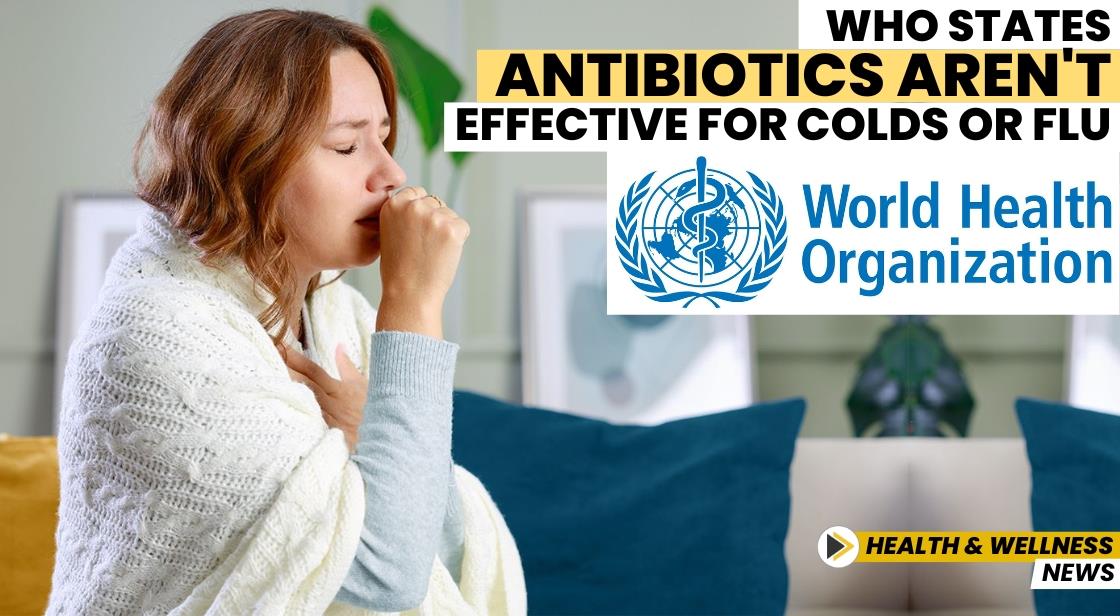WHO States Antibiotics Aren't Effective for Colds or Flu

Podcast
News Synopsis
The World Health Organization (WHO) has issued a reminder about the proper use of antibiotics, emphasizing that they are ineffective in treating viral infections such as colds, flu, and sore throats.
While it may be tempting to seek antibiotic treatment for these common illnesses, the WHO urges individuals to consult with a healthcare professional before taking any antibiotics. This message is part of a broader effort to encourage responsible use of antibiotics and help combat the growing threat of antibiotic resistance.
The Misconception About Antibiotics
When experiencing symptoms like a cough, runny nose, or sore throat, it’s common for individuals to expect a prescription for antibiotics. However, the WHO warns that antibiotics are not a cure for viral infections, which include the flu, colds, and many sore throats.
Antibiotics are specifically designed to treat bacterial infections and have no effect on viruses. By taking antibiotics for viral infections, patients could risk harming their health and further contributing to the global issue of antibiotic resistance.
The WHO's Social Media Message
In an effort to reach a wider audience, the WHO took to social media to clarify the limitations of antibiotics. In a recent Instagram post, the organization stated, “#Antibiotics do not treat viral infections such as colds and flu. Always seek advice from a qualified healthcare professional before taking antibiotics.” This clear message is intended to increase public awareness about the misuse of antibiotics and to remind individuals to follow professional medical guidance.
Promoting Responsible Antibiotic Use
The WHO’s warning underscores the need for responsible antibiotic use. While antibiotics are essential in treating many bacterial infections, their overuse or incorrect use can have serious consequences, including antibiotic resistance.
When antibiotics are used unnecessarily or incorrectly, they can become less effective over time, leading to infections that are harder to treat. By using antibiotics only when necessary and as prescribed by a healthcare professional, individuals can help prevent the development of antibiotic resistance.
The Risks of Antibiotics and Antibiotic Resistance
Taking antibiotics for viral infections can have several harmful effects. Common side effects include nausea, vomiting, diarrhea, abdominal pain, rash, and allergic reactions. More concerning, however, is the risk of developing antibiotic resistance.
Antibiotic resistance occurs when bacteria become resistant to the drugs that would normally kill them, making infections more difficult and costly to treat. The Food and Drug Administration (FDA) has warned that using antibiotics for viral infections such as colds, flu, and sore throats can lead to bacterial infections that are resistant to antibiotics, putting patients at greater risk.
The Importance of Rest and Hydration
Viral infections, while frustrating, are common and typically self-limiting. The body’s immune system is well-equipped to fight off these infections naturally. Rather than relying on antibiotics, individuals should focus on supporting their body’s immune response through rest, proper hydration, and a balanced diet.
Adequate sleep, hydration, and nutrition help the immune system function effectively, speeding up recovery and preventing complications. In most cases, symptoms of viral infections will subside on their own within a few days to a week.
Conclusion
The WHO’s reminder about the proper use of antibiotics is an essential step in raising awareness about the dangers of antibiotic misuse. By understanding that antibiotics do not work for viral infections, individuals can make more informed decisions about their health and contribute to the global effort to combat antibiotic resistance. When in doubt, it is always advisable to seek guidance from a healthcare professional, who can provide accurate advice and treatment options tailored to each individual’s condition. Responsible antibiotic use is vital for preserving the effectiveness of these life-saving medications for future generations.





